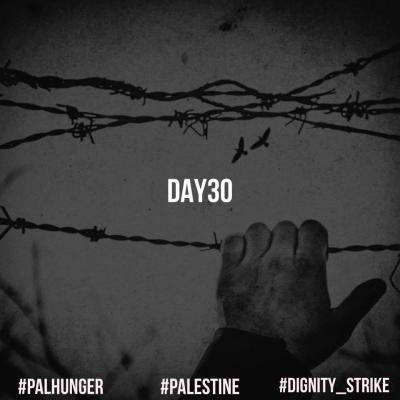
As a result of Israel’s cruel policies and practices towards Palestinian political prisoners and detainees, over 1500 political prisoners have declared the beginning of an open hunger strike on 17 April 2017 in order to achieve a list of demands:
One of the primary demands of the hunger strikers is an end to the policy of administrative detention. Approximately 500 Palestinians held in administrative detention, without charge or trial for indefinitely renewable periods of up to six months, on the basis of secret evidence. Israel's widespread and systematic use of administrative detention violates international human rights and humanitarian law and amounts to psychological torture.
Another key demand of the hunger strikers is an end to the use of solitary confinement in Israeli prisons and detention centers. The use of long-term solitary confinement is widely understood to be a form of cruel, inhuman or degrading treatment that may amount to torture. Israeli prison service has practiced the policy of isolation against the prisoners and detainees, as well as detention in secret prisons since 1967. The prison service exercises the policy of isolation as a punitive measure and it is based on the recommendation of the occupation intelligence services. Prisoners have suffered from permanent psychological harm due to Israeli government reliance on isolating Palestinian prisoners from meaningful human contact with their fellow prisoners.
An additional major component of the hunger strike addresses the denial of family visits to Palestinian prisoners, and the unlawful, inhumane and lengthy transfer process of prisoners. There are 17 prisons, four interrogation centers, and four detention centers. All but one of the prisons are located inside Israel, in direct contravention of Article 76 of the Fourth Geneva Convention, which states that an Occupying Power must detain residents of occupied territory in prisons inside the occupied territory. Thus, it is extremely difficult for family members to get permission to visit their loved one. Regular family visits are one of the many rights Palestinian political prisoners have been denied to have, so prisoners are asking to increase the length of family visits from 45 to 90 minutes. Imprisonment causes a huge amount of suffering and hardship, not only for those denied of their liberty, but for their relatives on the outside. Whole families and generations have grown up with no mother or father or brother or sister. The Israeli policy of mass detention and imprisonment has been devastating for Palestinian society, with families of prisoners being the silent victims.
In addition, hunger-striking prisoners demand improved medical treatment and access to specialized care; access to media, including books, clothing, and food from family members; restoring educational access to distance learning; and the installation of public pay telephones for family calls in each prison.
As a result of the hunger strike, Palestinian prisoners have been subjected to violent and coercive measures and policies by Israeli Prison Service and special units to push prisoners and detainees to end their hunger strikes. Prisoners have all been punished for their hunger strikes by being placed in solitary confinement and denied family and attorney visits, in an attempt to isolate them from the outside world; denial of recreational time; denial of access to the “canteen” (prison store); prohibition from participating in group prayers on Fridays; and seizure of salt. More troubling, the IPS has made it exceedingly difficult for independent doctors to visit the hunger striking prisoners and has provided prisoners with plastic cups in order to drink from the tap rather than the usually provided drinking water.
Additionally, all of the hunger-striking prisoners have been stripped of their possessions; only one blanket has been kept for each prisoner and one set of clothing in addition to the “Shabas clothing” or prison uniform. Hunger-striking prisoners were not given appropriate medical examination, only weight and blood pressure of the strikers were examined.
The alarmingly deteriorating situation in human rights of Palestinian political prisoners, compounded with widespread and systematic torture and ill-treatment, and lack of accountability and investigations for crimes by occupation forces, underlines the need for continued efforts towards a situation in which Palestinian prisoners are afforded fundamental and inherent human rights, and towards an end to a protracted and brutal occupation.
On the 30th day of hunger strike, Addameer Prisoner Support urges supporters of justice around the world to take action to support the Palestinian prisoners whose bodies and lives are on the line for freedom and dignity. Addameer urges all people to organize events in solidarity with the struggle of hunger-striking prisoners and detainees. Addameer further urges all political parties, institutions, organizations and solidarity groups working in the field of human rights in the occupied Palestinian territory and abroad to support the prisoners in their hunger strike and demand that their legitimate demands be granted. Addameer will continue to closely follow the prisoner’s strike and provide regular updates on the situation as it develops.
The year 2017 marks 100 years of the Balfour declaration; 70 years of Palestinian Catastrophe (al-Nakba); 50 years of brutal military occupation. This is also the year to hold the Israeli occupation accountable for its actions and to demand the immediate release of all Palestinian political prisoners.